人教版高中英语必修1 unit 5 Nelson mandela-a modern hero 单元课件(共66张ppt)
文档属性
| 名称 | 人教版高中英语必修1 unit 5 Nelson mandela-a modern hero 单元课件(共66张ppt) | 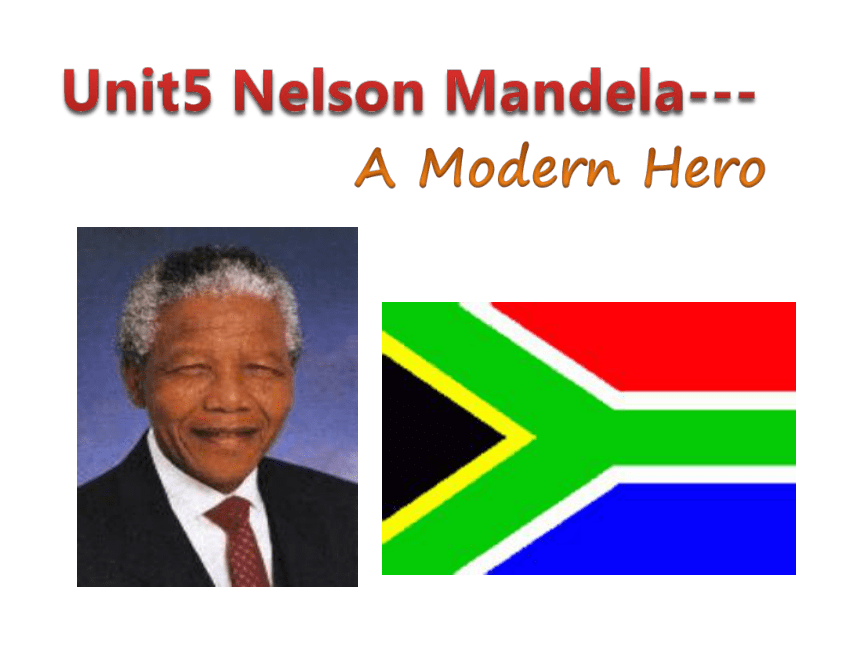 | |
| 格式 | zip | ||
| 文件大小 | 1.3MB | ||
| 资源类型 | 教案 | ||
| 版本资源 | 人教版(新课程标准) | ||
| 科目 | 英语 | ||
| 更新时间 | 2016-01-16 15:45:56 | ||
图片预览



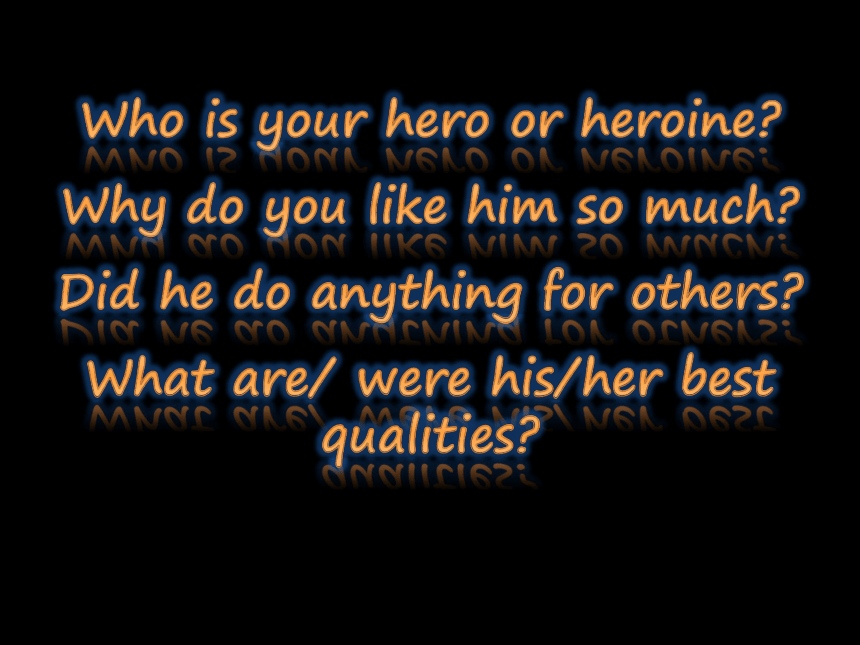
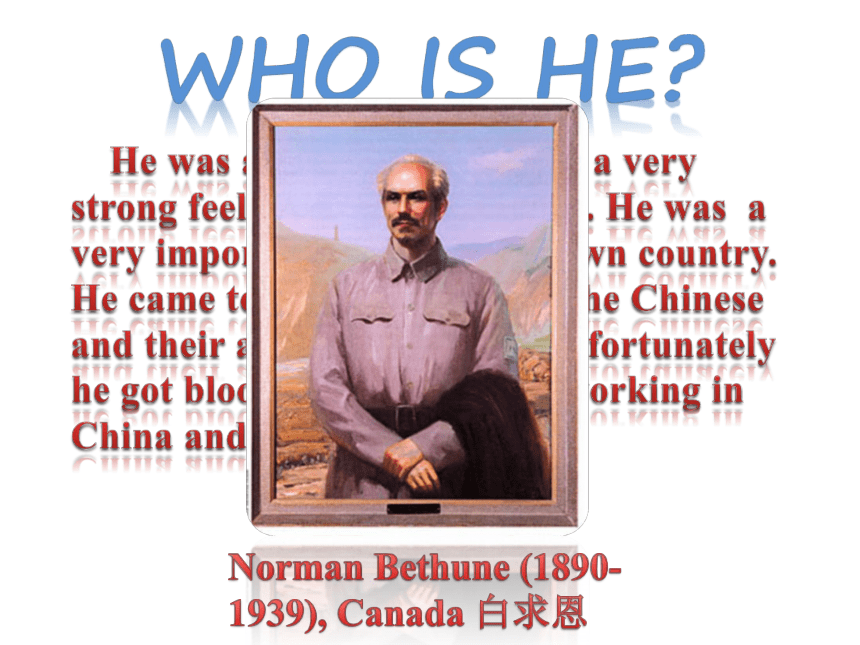
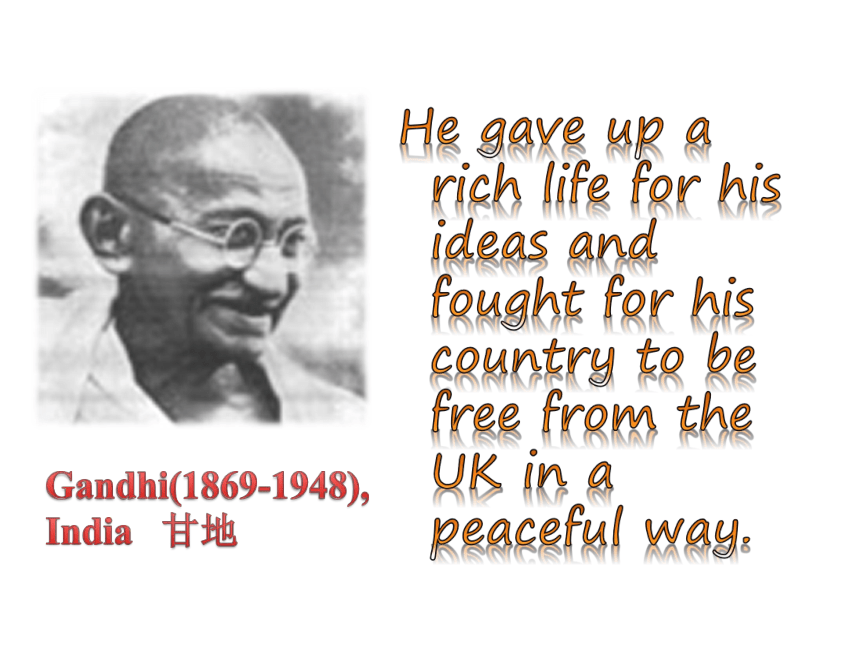
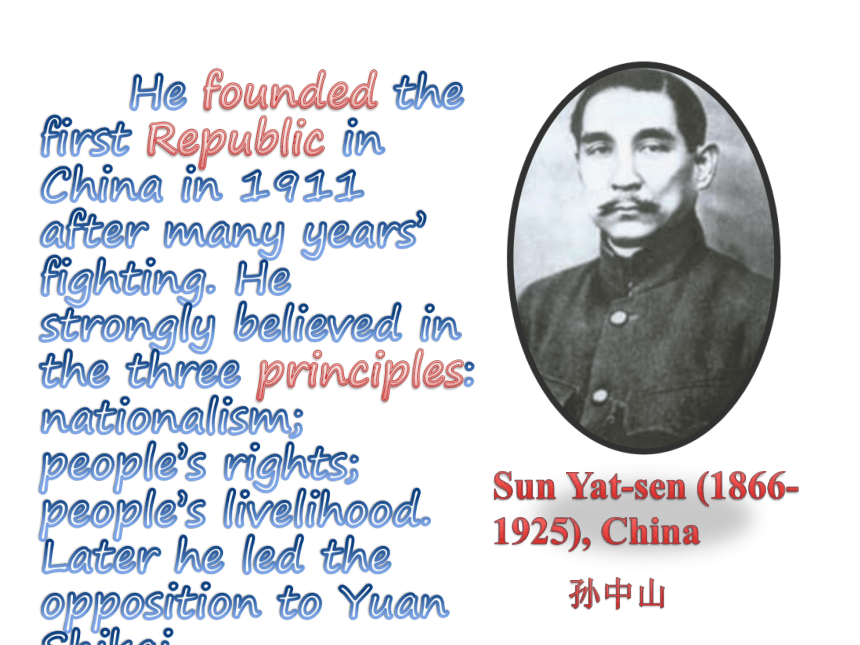
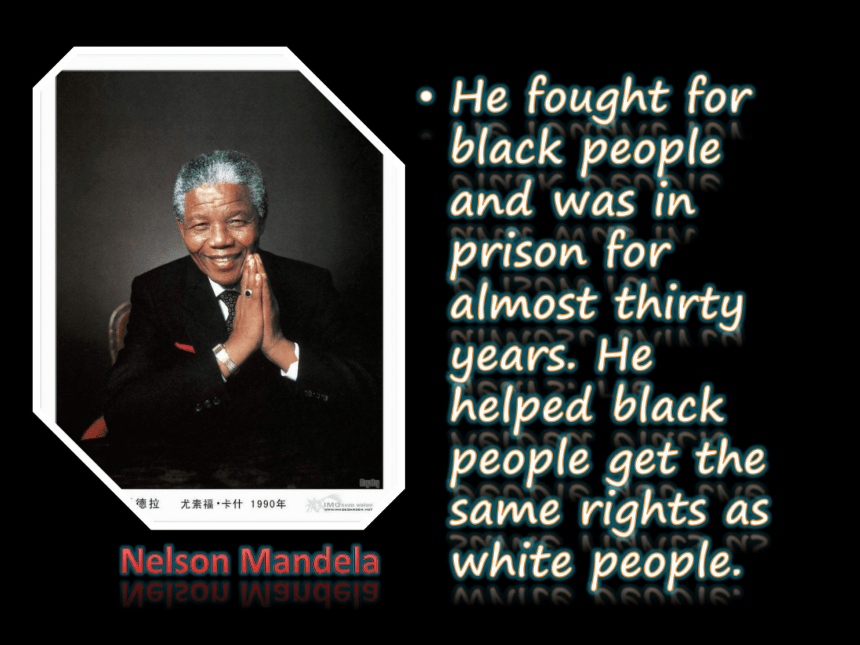
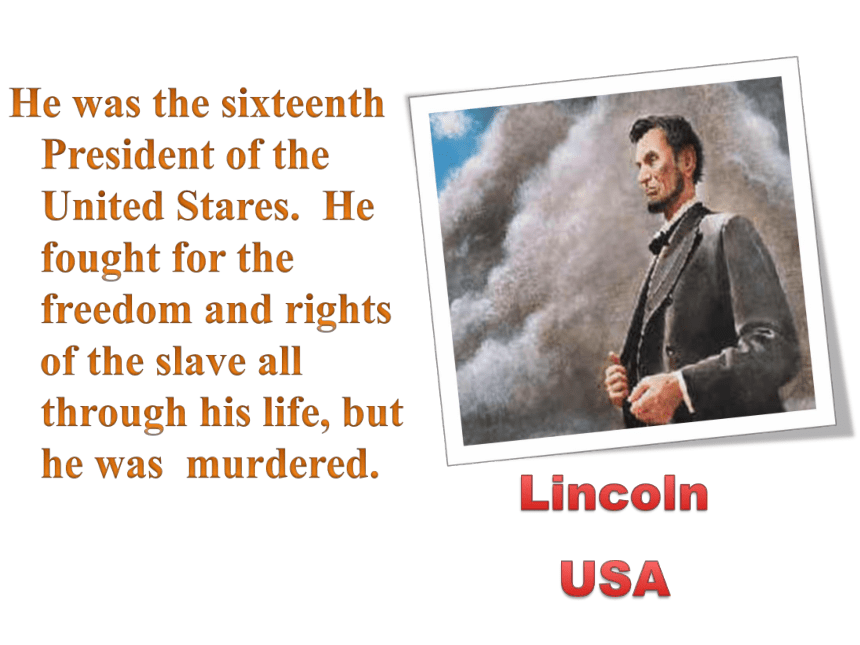
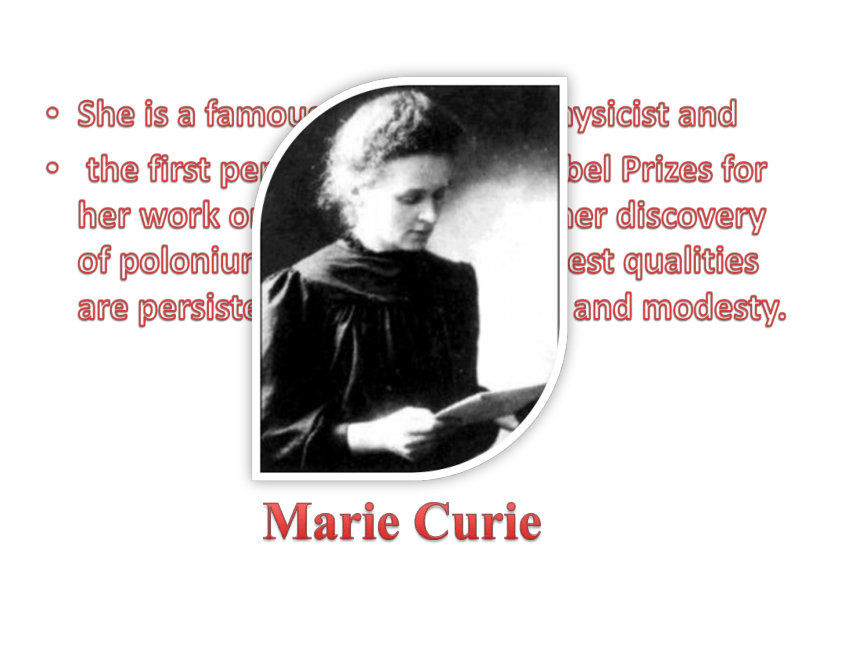

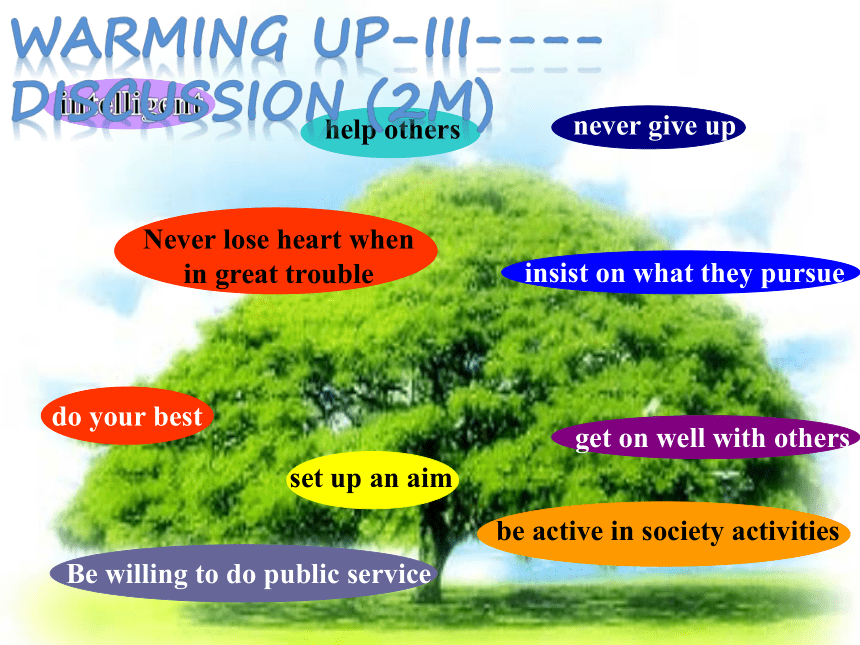
文档简介
课件66张PPT。Unit5 Nelson Mandela--- A Modern HeroWho is he/she ?Some useful phrase:
He/she is … (clever, tall, brave, honest, and so on)
He/she is good at … His/her hobby is …
He/she prefers to … guessingPlease describe one of your classmate
as detailed as possible.Warming upPeriod 1MY HEROWho is your hero or heroine?
Why do you like him so much?
Did he do anything for others?
What are/ were his/her best qualities?Who is he? He was a Canadian who has a very strong feeling against injustice. He was a very important doctor in his own country. He came to China to support the Chinese and their army as a doctor. Unfortunately he got blood poisoning while working in China and died here.Norman Bethune (1890-1939), Canada 白求恩He gave up a rich life for his ideas and fought for his country to be free from the UK in a peaceful way.Gandhi(1869-1948), India 甘地 He founded the first Republic in China in 1911 after many years’ fighting. He strongly believed in the three principles: nationalism; people’s rights; people’s livelihood. Later he led the opposition to Yuan Shikai.Sun Yat-sen (1866-1925), China
孙中山He fought for black people and was in prison for almost thirty years. He helped black people get the same rights as white people. Nelson MandelaHe was the sixteenth President of the United Stares. He fought for the freedom and rights of the slave all through his life, but he was murdered.Lincoln
USAShe is a famous chemist and physicist and
the first person to win two Nobel Prizes for her work on radioactivity and her discovery of polonium and radium. Her best qualities are persistence, determination and modesty.Marie CurieAre they great people? A great person is someone who devotes his/her life to help others.
What qualities does a
great person have?never give upintelligentNever lose heart when in great trouble do your bestset up an aimget on well with othersinsist on what they pursuehelp othersbe active in society activitiesBe willing to do public serviceWarming up-III----discussion (2m)There’s a hero
If you look inside your heart
You don’t have to be afraid
Of what you are
There’s an answer
If you reach into your soul
And the sorrow that you know
Will melt away
And then a hero comes along
With the strength to carry on
And you cast your fears aside
And you know you can survive
So when you feel like hope is gone
Look inside you and be strong
And you’ll finally see the truth.
That a hero lies in you.Elias’ StoryReading IElias How many parts can the text be divided into? Give the general idea of each part. Part IParagraph 1-2 The life of Elias’ before he met Nelson Mandela.Paragraph 3-5 The change of Elias’ life after he met Nelson Mandela and what Mandela did.Part IIDo exercise 1 on page 35. Fast reading Is it fair to treat others badly for things they cannot change, like the color of skin or eyes or the race one belong to?
Definitely unfair!1946 began school1948 leave couldn’t write or readTrying hardLater got a job be worried about out of work▼▼▼▼▼▼1940▼▼ born▼▼1952 went to Mandela for advice▼▼When he organized …joined▼▼1963helped him blow upRetellUsing LanguageListening Page 38Why did Elias join the ANC Youth League?Because it fought for equal rights for
black and white people in South Africa. What is a passbook?
A. A book to help you pass exams.
B. A book to show your identity.
C. A book to tell you where to live.
D. A book to tell you how to live.
2. Who worked underground?
A. The white workers.
B. The black and white workers.
C. The black workers.
D. Foreign workers.
BCC3. Where did Elias live?
A. In a classroom.
B. In a home of his own.
C. In a large room with beds.
D. With his family.
The Rest of Elias’ StoryElias Robben Island1. How did Mandela help Elias when he was on Robben Island?
Mr. Mandela began a school for those who had little learning.
2. how did Mandela help Elias when he was set free?
Mr. Mandela gave Elias a job taking tourists around his old prison on Robben Island. Discussion
What have you learned from Nelson Mandela? For what quality do you admire him most? Language point1. He fought against the German Nazis and Japanese invaders during World War II. 二战时期他抵抗德国纳粹和日本侵略者。
fight (fought, fought)
fight for 为……而战
fight against 与……作斗争
We will have to fight against difficulties.
They told the workers to fight for their rights.
2. He founded the first Republic in China in 1911 after many years’ fighting. 经过多年斗争他于1911在中国创建了第一个共和国。
found (founded, founded) 建立,创建
find (found, found)
The hospital was founded in 1920.
Have you found your missing pen?
3. He strongly believed in the three principles: nationalism; people’s rights; people’s livelihood. 他坚信三条原则:民族,民权,民生。
believe in 信任,信仰
Do you believe in God?
We believe in our government.
believe sb. = believe what sb. says 相信某人的话
believe in sb. 信任某人
I believe what he said because I believe in him.4. He fought for the black people and was in prison for thirty years. 他为黑人而战且坐过三十年监狱。
be in prison 在狱中,被监禁
He has been in prison for five years.
put…in prison = send…to prison = throw …into prison 把……投入监狱
The car thieves have been put in prison.
He was sent to prison for ten years.
5. The time when I first met Nelson Mandela was a very difficult period of my life.
period 期间,时期,学校的一节课,周期
Let’s finish this period and have a break.
a period of rotation 自转周期
the time when 其中when 引起定语从句
This was a time when you had got to have a passbook to live in Johannesburg.
Do you still remember the time when we first met?
6. It was in 1952 and Mandela was the black lawyer to whom I went for advice. He offered guidance to poor black people on their legal problems. He was generous with his time, for which I was grateful.
那是在1952年,曼德拉是我寻求帮助的一位黑人律师。他为那些穷苦黑人提供法律指导。他十分慷慨得给与我时间,我为此非常感激。To whom I went for advice是定语从句修饰the black lawyer,关系代词whom 前介词用to, 是因为从句里动词went的搭配需要,即: whom I went to for advice.
For witch I was grateful一句中,关系代词 which前用介词 for是由于从句中形容词 grateful的搭配: be grateful for sth。 1) advise sb. on sth. 就……给某人出主意
I have advised you on that subject.
2) advise sb. to do sth. 建议某人干……
Our monitor advises me to practice more spoken English.
3) advise that +(should) do
I advise that you (should) not eat fruit that isn’t ripe.7. The last thirty years have seen the greatest number of laws stopping our rights and progress, until today we have reached a stage where we have almost no rights at all. 过去30年来所出现的大量法律剥夺了我们的权利,阻挡我们的进步,一直到今天,,我们还处在几乎没有什么权利都没有的阶段。
see 在此句意为“经历;有..经历
You and I have seen some good times together. 你我一起共同度过一段美好的时光。
during the war he saw service in the Far East.
战争期间他在远东服役。 Stage:
1 舞台
I went on stage and did my show.
2 阶段,时期
the plan is still in its early stages. in a position to do sth 能够,有能力
I’m not in a position to help you right now.
In/out of position 在适当的位置,在不适当的位置
This chair is out of position. Please put it back in position. 8.We were put into a position in which we had either to accept we were less important of fight the government.我们被置于这样一个境地:要么我们被迫接受低人一等的现实,要么更政府作斗争。 用only修饰副词或状语又放在句首时,这个句子要局部倒装。
Only in this way can you solve the problem
Only 如果修饰主语,句子不需要倒装。
Only one thing can make him change his mind. 9. We first broke the law in a way which was peaceful…only then did we decide to answer violence with violence. 首先我们用和平的方式来破坏法律;而当这种方式也得不到允许时,..只有到这个时候,我们才决定用暴力反抗暴力。 Turn to: 求助于;转向
I tried to stand on my own two feet rather than turned to my parents
Turn to the left and you will find the post 10.Why did Nelson Mandela turn to violence to make black and white people equal?11. I did not work again for twenty years until Mr. Mandela and the ANC came to power in 1993.
come to power 上台;当权
in power 执政
take power 用武力夺取政权
Things have changed a lot since he came to power.
How long has he been in power?
the general had tried to take power, but he failed at last.
12. All the terror and fear of that time came back to me.
fear n. 恐惧,可怕
vt. 恐惧,害怕 + n./to do /that…
Do you fear death?
She fears to speak in our presence.
I fear that we can’t protect ourselves.
for fear of …& for fear that… 担心
He left an hour earlier for fear of missing the train.
She worried for fear that the child would be hurt.
13. They said that the job and the pay from the new South African government were my reward after working all my life for equal rights for the Blacks.
reward n. 报酬,奖金
He worked hard but without much reward.
vt. 酬谢,给以报答
He rewarded me with a prize.
in reward 作为报酬
She got nothing in reward for her kindness.
14. The scientist from whom___ never lost heart when he was in trouble.
lose heart 灰心,丧失信心
Please don’t lose heart, you still have more chances.
lose one’s heart 爱上,喜欢上
She lost heart to him as soon as she saw the handsome soldier.
in trouble 有麻烦,处于不幸中
He never came expect when he was in trouble.Listening task p72On the road2Walking in the bicycle lane
of the roadComing up behind the boyThe car was going too fast and did not look.It hit the boy and hurt him.
On the road.2Walking in the road.Came up behind the boy. The boy moved further into the road. The car tried to stop but it couldn’t and it hit the boy. The boy was hurt.The boy.A Follower of Bill GatesChief executive officer Produced Microsoft NoneGave money to help the education and health of many children around the worldOther people are jealous of his success.They think he is too big and too powerful and unfair to his competitors.Information About Bill Gates Bill Gate is a successful and rich man, but is he a great man? Has he given up anything (not money) in his life to help other people and made things fairer in the world? Divide the students into groups of the four to discuss the question. After the discussion, the representatives from each group present the discussion of their group.Is Bill Gate a great man?Discussion (5m)The Attributive Clause
定语从句 2that 即指人又指物,作主语或宾语。
which 指物,作主语或宾语。
who, whom指人, who作主语, whom作宾语。
that,which,whom在定语从句中作宾语时,可省去。1) A plane is a machine ________________ can fly.
2) The car _______________________ my uncle bought last week was stolen.
3) The students ________________ don’t study hard will not pass the exam.
4) The woman ___________________ you saw in the park is our English teacher.
5) He talked happily about the men and books_______ interested him greatly in the school.which/thatwhich/that/ 省略who/thatwhom/that/ 省略thatReview关系副词when, where, why引导定语从句where 表示地点,其先行词往往是表示地点的名词, 如place, room, house, street, area等。
This is the house where I lived last year.
This is the hospital where I was born.
in the house= whereIn the hospital=where关系副词实际上是介词+先行词2. when表示时间,其先行词往往是表示时间的名词,如time, day, hour, year等。
I still remember the day when I came hereOn the day= when This was a time when there were still slaves in the USA. During the time=when3. why表示原因,常放在先行词reason后面.
This is the reason why he cried.
for the reason=whyThere are many reasons why people
like traveling.for the reasons =whyBeijing is a beautiful city. I went there
last summer. Beijing is a beautiful city where I went last summer.2. I remember the day. My father made his first real film on that day.I remember the day when/on which my father made his first real film.3. The reason was that he passed the exam. He was so happy for the reason.The reason why/for which he was so happy was that he passed the exam.把下面的句子连接成定语从句
???关系副词功能表关系副词实际上是介词+which1.I’ll never forget the days______________ we worked
together.
2.I’ll never forget the days ___________ we spent together.
3.I went to the place I worked ten years
ago.
4.I went to the place _____________ I visited ten years ago.
5.This is the reason _____________________ he was late.
6.This is the reason _____________________ he gave.
when /in whichwhichwhere/ in whichwhichwhy/ for whichthat/which几种易混的情况及物动词及物动词及物动词Fill in the blank with correct word.( when, why & where)We will put off the picnic until next week, _____the weather may be better.
The place _____ I met him was a supermarket.
He refused to disclose the reason _____ he did it.
Beijing is a beautiful city _____ I went last summer.
wherewhywhenwhereThe factory _____ I worked was 9km away from my house.
The time ______ I arrived was late at night.
That is no reason ______ you should leavewherewhenwhy介词+关系代词的情况 1The man whom you spoke was a scientist.
The city which she lives is far away.toin介词+关系代词的情况 2The man who/whom you spoke was a
scientist.
The city that/which she lives is
far away.toinAre these two sentences right?介词+关系代词的情况 3The man who/whom you spoke was a
scientist.
The city that/which she lives is
far away.toinAre these two sentences right?介词+关系代词的情况 3The man who/whom you spoke was a
scientist.
The city that/which she lives is
far away.toinAre these two sentences right?介词+关系代词的情况 3The man who/whom you spoke was a
scientist.
The city that/which she lives is
far away.toin× × Are these two sentences right?可见,who、that 不能用与介词之后 介词+关系代词的情况 练习Do you like the book __________ she spent 10$?
Do you like the book __________ she paid
10$?
3. Do you like the book _________ she learned a lot?
4.Do you like the book ________ she often talks?
5. He built a telescope _________ he can study the sky. on whichfor whichfrom whichabout whichthrough which6. There is a tall tree outside, ______
Stand our Teacher.
7.China has a lot of rivers, the second longest _______ is the Yellow River.
8. The tower _______ people can have a good view is on the hill.
9. The man ________ I spoke on the phone last night is very good at wrestling.
10. He paid the boy $10 for washing ten windows, most ______ hadn’t been cleaned for at least a year.under whichof whichfrom whichto whomof which
He/she is … (clever, tall, brave, honest, and so on)
He/she is good at … His/her hobby is …
He/she prefers to … guessingPlease describe one of your classmate
as detailed as possible.Warming upPeriod 1MY HEROWho is your hero or heroine?
Why do you like him so much?
Did he do anything for others?
What are/ were his/her best qualities?Who is he? He was a Canadian who has a very strong feeling against injustice. He was a very important doctor in his own country. He came to China to support the Chinese and their army as a doctor. Unfortunately he got blood poisoning while working in China and died here.Norman Bethune (1890-1939), Canada 白求恩He gave up a rich life for his ideas and fought for his country to be free from the UK in a peaceful way.Gandhi(1869-1948), India 甘地 He founded the first Republic in China in 1911 after many years’ fighting. He strongly believed in the three principles: nationalism; people’s rights; people’s livelihood. Later he led the opposition to Yuan Shikai.Sun Yat-sen (1866-1925), China
孙中山He fought for black people and was in prison for almost thirty years. He helped black people get the same rights as white people. Nelson MandelaHe was the sixteenth President of the United Stares. He fought for the freedom and rights of the slave all through his life, but he was murdered.Lincoln
USAShe is a famous chemist and physicist and
the first person to win two Nobel Prizes for her work on radioactivity and her discovery of polonium and radium. Her best qualities are persistence, determination and modesty.Marie CurieAre they great people? A great person is someone who devotes his/her life to help others.
What qualities does a
great person have?never give upintelligentNever lose heart when in great trouble do your bestset up an aimget on well with othersinsist on what they pursuehelp othersbe active in society activitiesBe willing to do public serviceWarming up-III----discussion (2m)There’s a hero
If you look inside your heart
You don’t have to be afraid
Of what you are
There’s an answer
If you reach into your soul
And the sorrow that you know
Will melt away
And then a hero comes along
With the strength to carry on
And you cast your fears aside
And you know you can survive
So when you feel like hope is gone
Look inside you and be strong
And you’ll finally see the truth.
That a hero lies in you.Elias’ StoryReading IElias How many parts can the text be divided into? Give the general idea of each part. Part IParagraph 1-2 The life of Elias’ before he met Nelson Mandela.Paragraph 3-5 The change of Elias’ life after he met Nelson Mandela and what Mandela did.Part IIDo exercise 1 on page 35. Fast reading Is it fair to treat others badly for things they cannot change, like the color of skin or eyes or the race one belong to?
Definitely unfair!1946 began school1948 leave couldn’t write or readTrying hardLater got a job be worried about out of work▼▼▼▼▼▼1940▼▼ born▼▼1952 went to Mandela for advice▼▼When he organized …joined▼▼1963helped him blow upRetellUsing LanguageListening Page 38Why did Elias join the ANC Youth League?Because it fought for equal rights for
black and white people in South Africa. What is a passbook?
A. A book to help you pass exams.
B. A book to show your identity.
C. A book to tell you where to live.
D. A book to tell you how to live.
2. Who worked underground?
A. The white workers.
B. The black and white workers.
C. The black workers.
D. Foreign workers.
BCC3. Where did Elias live?
A. In a classroom.
B. In a home of his own.
C. In a large room with beds.
D. With his family.
The Rest of Elias’ StoryElias Robben Island1. How did Mandela help Elias when he was on Robben Island?
Mr. Mandela began a school for those who had little learning.
2. how did Mandela help Elias when he was set free?
Mr. Mandela gave Elias a job taking tourists around his old prison on Robben Island. Discussion
What have you learned from Nelson Mandela? For what quality do you admire him most? Language point1. He fought against the German Nazis and Japanese invaders during World War II. 二战时期他抵抗德国纳粹和日本侵略者。
fight (fought, fought)
fight for 为……而战
fight against 与……作斗争
We will have to fight against difficulties.
They told the workers to fight for their rights.
2. He founded the first Republic in China in 1911 after many years’ fighting. 经过多年斗争他于1911在中国创建了第一个共和国。
found (founded, founded) 建立,创建
find (found, found)
The hospital was founded in 1920.
Have you found your missing pen?
3. He strongly believed in the three principles: nationalism; people’s rights; people’s livelihood. 他坚信三条原则:民族,民权,民生。
believe in 信任,信仰
Do you believe in God?
We believe in our government.
believe sb. = believe what sb. says 相信某人的话
believe in sb. 信任某人
I believe what he said because I believe in him.4. He fought for the black people and was in prison for thirty years. 他为黑人而战且坐过三十年监狱。
be in prison 在狱中,被监禁
He has been in prison for five years.
put…in prison = send…to prison = throw …into prison 把……投入监狱
The car thieves have been put in prison.
He was sent to prison for ten years.
5. The time when I first met Nelson Mandela was a very difficult period of my life.
period 期间,时期,学校的一节课,周期
Let’s finish this period and have a break.
a period of rotation 自转周期
the time when 其中when 引起定语从句
This was a time when you had got to have a passbook to live in Johannesburg.
Do you still remember the time when we first met?
6. It was in 1952 and Mandela was the black lawyer to whom I went for advice. He offered guidance to poor black people on their legal problems. He was generous with his time, for which I was grateful.
那是在1952年,曼德拉是我寻求帮助的一位黑人律师。他为那些穷苦黑人提供法律指导。他十分慷慨得给与我时间,我为此非常感激。To whom I went for advice是定语从句修饰the black lawyer,关系代词whom 前介词用to, 是因为从句里动词went的搭配需要,即: whom I went to for advice.
For witch I was grateful一句中,关系代词 which前用介词 for是由于从句中形容词 grateful的搭配: be grateful for sth。 1) advise sb. on sth. 就……给某人出主意
I have advised you on that subject.
2) advise sb. to do sth. 建议某人干……
Our monitor advises me to practice more spoken English.
3) advise that +(should) do
I advise that you (should) not eat fruit that isn’t ripe.7. The last thirty years have seen the greatest number of laws stopping our rights and progress, until today we have reached a stage where we have almost no rights at all. 过去30年来所出现的大量法律剥夺了我们的权利,阻挡我们的进步,一直到今天,,我们还处在几乎没有什么权利都没有的阶段。
see 在此句意为“经历;有..经历
You and I have seen some good times together. 你我一起共同度过一段美好的时光。
during the war he saw service in the Far East.
战争期间他在远东服役。 Stage:
1 舞台
I went on stage and did my show.
2 阶段,时期
the plan is still in its early stages. in a position to do sth 能够,有能力
I’m not in a position to help you right now.
In/out of position 在适当的位置,在不适当的位置
This chair is out of position. Please put it back in position. 8.We were put into a position in which we had either to accept we were less important of fight the government.我们被置于这样一个境地:要么我们被迫接受低人一等的现实,要么更政府作斗争。 用only修饰副词或状语又放在句首时,这个句子要局部倒装。
Only in this way can you solve the problem
Only 如果修饰主语,句子不需要倒装。
Only one thing can make him change his mind. 9. We first broke the law in a way which was peaceful…only then did we decide to answer violence with violence. 首先我们用和平的方式来破坏法律;而当这种方式也得不到允许时,..只有到这个时候,我们才决定用暴力反抗暴力。 Turn to: 求助于;转向
I tried to stand on my own two feet rather than turned to my parents
Turn to the left and you will find the post 10.Why did Nelson Mandela turn to violence to make black and white people equal?11. I did not work again for twenty years until Mr. Mandela and the ANC came to power in 1993.
come to power 上台;当权
in power 执政
take power 用武力夺取政权
Things have changed a lot since he came to power.
How long has he been in power?
the general had tried to take power, but he failed at last.
12. All the terror and fear of that time came back to me.
fear n. 恐惧,可怕
vt. 恐惧,害怕 + n./to do /that…
Do you fear death?
She fears to speak in our presence.
I fear that we can’t protect ourselves.
for fear of …& for fear that… 担心
He left an hour earlier for fear of missing the train.
She worried for fear that the child would be hurt.
13. They said that the job and the pay from the new South African government were my reward after working all my life for equal rights for the Blacks.
reward n. 报酬,奖金
He worked hard but without much reward.
vt. 酬谢,给以报答
He rewarded me with a prize.
in reward 作为报酬
She got nothing in reward for her kindness.
14. The scientist from whom___ never lost heart when he was in trouble.
lose heart 灰心,丧失信心
Please don’t lose heart, you still have more chances.
lose one’s heart 爱上,喜欢上
She lost heart to him as soon as she saw the handsome soldier.
in trouble 有麻烦,处于不幸中
He never came expect when he was in trouble.Listening task p72On the road2Walking in the bicycle lane
of the roadComing up behind the boyThe car was going too fast and did not look.It hit the boy and hurt him.
On the road.2Walking in the road.Came up behind the boy. The boy moved further into the road. The car tried to stop but it couldn’t and it hit the boy. The boy was hurt.The boy.A Follower of Bill GatesChief executive officer Produced Microsoft NoneGave money to help the education and health of many children around the worldOther people are jealous of his success.They think he is too big and too powerful and unfair to his competitors.Information About Bill Gates Bill Gate is a successful and rich man, but is he a great man? Has he given up anything (not money) in his life to help other people and made things fairer in the world? Divide the students into groups of the four to discuss the question. After the discussion, the representatives from each group present the discussion of their group.Is Bill Gate a great man?Discussion (5m)The Attributive Clause
定语从句 2that 即指人又指物,作主语或宾语。
which 指物,作主语或宾语。
who, whom指人, who作主语, whom作宾语。
that,which,whom在定语从句中作宾语时,可省去。1) A plane is a machine ________________ can fly.
2) The car _______________________ my uncle bought last week was stolen.
3) The students ________________ don’t study hard will not pass the exam.
4) The woman ___________________ you saw in the park is our English teacher.
5) He talked happily about the men and books_______ interested him greatly in the school.which/thatwhich/that/ 省略who/thatwhom/that/ 省略thatReview关系副词when, where, why引导定语从句where 表示地点,其先行词往往是表示地点的名词, 如place, room, house, street, area等。
This is the house where I lived last year.
This is the hospital where I was born.
in the house= whereIn the hospital=where关系副词实际上是介词+先行词2. when表示时间,其先行词往往是表示时间的名词,如time, day, hour, year等。
I still remember the day when I came hereOn the day= when This was a time when there were still slaves in the USA. During the time=when3. why表示原因,常放在先行词reason后面.
This is the reason why he cried.
for the reason=whyThere are many reasons why people
like traveling.for the reasons =whyBeijing is a beautiful city. I went there
last summer. Beijing is a beautiful city where I went last summer.2. I remember the day. My father made his first real film on that day.I remember the day when/on which my father made his first real film.3. The reason was that he passed the exam. He was so happy for the reason.The reason why/for which he was so happy was that he passed the exam.把下面的句子连接成定语从句
???关系副词功能表关系副词实际上是介词+which1.I’ll never forget the days______________ we worked
together.
2.I’ll never forget the days ___________ we spent together.
3.I went to the place I worked ten years
ago.
4.I went to the place _____________ I visited ten years ago.
5.This is the reason _____________________ he was late.
6.This is the reason _____________________ he gave.
when /in whichwhichwhere/ in whichwhichwhy/ for whichthat/which几种易混的情况及物动词及物动词及物动词Fill in the blank with correct word.( when, why & where)We will put off the picnic until next week, _____the weather may be better.
The place _____ I met him was a supermarket.
He refused to disclose the reason _____ he did it.
Beijing is a beautiful city _____ I went last summer.
wherewhywhenwhereThe factory _____ I worked was 9km away from my house.
The time ______ I arrived was late at night.
That is no reason ______ you should leavewherewhenwhy介词+关系代词的情况 1The man whom you spoke was a scientist.
The city which she lives is far away.toin介词+关系代词的情况 2The man who/whom you spoke was a
scientist.
The city that/which she lives is
far away.toinAre these two sentences right?介词+关系代词的情况 3The man who/whom you spoke was a
scientist.
The city that/which she lives is
far away.toinAre these two sentences right?介词+关系代词的情况 3The man who/whom you spoke was a
scientist.
The city that/which she lives is
far away.toinAre these two sentences right?介词+关系代词的情况 3The man who/whom you spoke was a
scientist.
The city that/which she lives is
far away.toin× × Are these two sentences right?可见,who、that 不能用与介词之后 介词+关系代词的情况 练习Do you like the book __________ she spent 10$?
Do you like the book __________ she paid
10$?
3. Do you like the book _________ she learned a lot?
4.Do you like the book ________ she often talks?
5. He built a telescope _________ he can study the sky. on whichfor whichfrom whichabout whichthrough which6. There is a tall tree outside, ______
Stand our Teacher.
7.China has a lot of rivers, the second longest _______ is the Yellow River.
8. The tower _______ people can have a good view is on the hill.
9. The man ________ I spoke on the phone last night is very good at wrestling.
10. He paid the boy $10 for washing ten windows, most ______ hadn’t been cleaned for at least a year.under whichof whichfrom whichto whomof which
